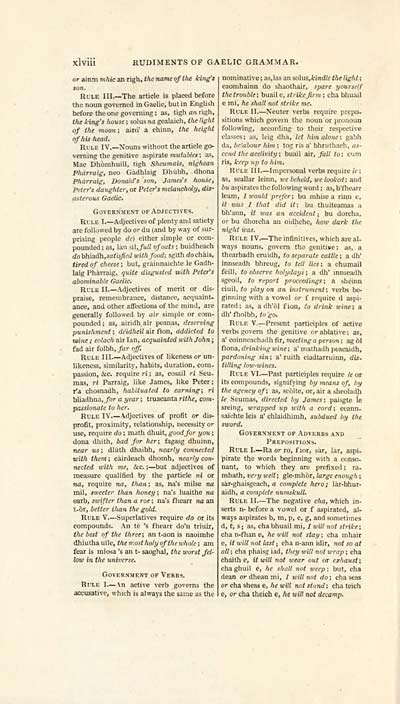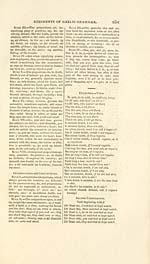Download files
Complete book:
Individual page:
Thumbnail gallery: Grid view | List view

xlvlii
RUDIMENTS OF GAELIC GRAMMAR.
or ainm mhic an righ, the nanie of the king's
son.
Rule III.— The article is placed before
the noun governed in Gaelic, but in English
before the one governing ; as, tigh an righ,
the king's house ; solus tw gealaich, the light
of the moon; airà' a chinn, the height
of his head.
Role IV.— Nouns without the article go-
verning the genitive aspirate mutables ; as,
Mac DhòmhuiU, tigh Sheumais, nighean
Phdrraig, neo Gadhlaig Dhiibh, dhona
Phdrraig, Donald's son, James's house,
Peter's daughter, or Peter's melaneholy, dis-
asterous Gaelic.
Government of Adjectives.
Rule I. — Adjectives of plenty and satiety
are followed by do or du (and by way of sur-
prising people de) either simple or com-
pounded; as, Ian i\\,full of oats ; buidheach
do ìMaAh.satiiJied with food; sgith do chàis,
tired of cheese ; but, grainnaichte le Gadh-
laig Pharraig, quite disgusted with Peter's
abominable Gaelic.
Rule II.— Adjectives of merit or dis-
praise, remembrance, distance, acquaint-
ance, and other affections of the mind, are
generally followed by air simple or com-
pounded; as, airidh air peanas, deserving
punishment ; dèidheil air fion, addicted to
viine ; eolach air Ian, acquainted with John ;
fad air folbh, /aroj;
Rule III Adjectives of likeness or un-
likeness, similarity, habits, duration, com-
passion, Aic. require ri ; as, cosail ri Sen.
mas, ri Parraig, like James, like Peter;
fa chosnadh, habituated to earning; ri
bliadhna, /or a year ; truacanta rithe, com-
passionate to her.
Rule IV. — Adjectives of profit or dis-
profit, proximity, relationship, necessity or
use, require do ; math dhuit, good for you ;
dona dhith, bad for her; fagasg dhuinn,
near us ; dliith dhaibh, nearly connected
with them ; càirdeach dhomh, nearly con-
nected with me, &.C. ;— but adjectives of
measure qualified by the particle ni or
na, require na, than ; as, na's milse na
mil, sweeter than honey; na's luaithe Tia
earb, swifter than a roe ; na's fhearr na an
t-òr, better ilian the gold.
Rule V — Superlatives require do or its
compounds. An tè 's fhearr do'n triuir,
the best of the three; an t-aon is naoimhe
dhiutha uile, the ir.ost holy of the whole ; am
fear is miosa 's an t- saoghal, the worst fel-
low in the universe.
Government of Verbs.
Rule I — An active verb governs the
accusative, which is always the same as the
nominative ; as.las an sol\xs,kindle the light ;
caomhainn do shaothair, spare yourself
the trouble ; buail e, strike fir ?n ; cha bhuail
e mi, he shall not strike me.
Rule II. — Neuter verbs require prepo-
sitions which govern the noun or pronoun
following, according to their respective
classes ; as, leig dha, let him alone ; gabh
da, be'abour him ; tog ris a' bhruthaeh, as-
cend the acclivity ; buail air, fall to; cum
ris, keep up to him.
Rule III.— Impersonal verbs require /c;
as, seallar leinn, we beheld, we looked; and
bu aspirates the following word ; as, b'fhearr
leam, I would prefer; bu mhise a rinn e,
it was I that did it; bu thuiteamas a
bh'ann, it was an accident ^ bu dorcha,
or bu dhorcha an oidhche, how dark the
night was.
Rule IV — The infinitives, which are al.
ways nouns, govern the genitive; as, a
thearbadh eruidh, to separate cattle; a dh'
innseadh bhreug, to tell lies; a chumail
feill, to observe holydays ; a dh' mnsearih
sgeoil, to report proceedings; a sheinn
eiuil, to play on an instrument; verbs be-
ginning with a vowel or f require d aspi-
rated; as, a dh'òl fion, to drink wine; a
dh' fholbh, to go.
Rule V.— Present participles of active
verbs govern the genitive or ablative; as,
a' coinneachadh fir, meeting a person ; ag òl
flona, drinking wine ; a' mathadh peacaidh,
pardoning sin; a' ruith ciadtarruinn, dis-
tilling low-wines.
Rule VI — Past participles require le or
its compounds, signifying by means of, by
the agency of; as, seòlte, or, air a sheoladh
le Seuraas, directed by James; paisgte le
sreing, wrapped up with a cord; ceann.
saichte leis a" chlaidhimh, subdued by the
sword.
Government of Adverbs and
Prepositions.
Rule I.— Ra or ro, f lor, sar, lar, aspi-
pirate the words beginning with a conso-
nant, to which they are prefixed ; ra.
mhath, very well; gle-mhòr, large enough ;
sar-ghaisgeach, a complete hero; lar-bhur-
aidh, a complete numskull.
Rule II.— The negative cAa, which in-
serts n- before a vowel or f aspirated, al-
ways aspirates b, m, p, c, g, and sometimes
d, t, s J as, cha bhuail mi, / will not strike ;
cha n-fhan e, he will not stay ; cha mhair
e, it will not last ; cha n-ann idir, not so at
all ; cha phaisg iad, they will not wrap ; cha
chaith e, it will not wear out or eihatist;
cha ghuil e, he shall not weep ; but, cha
dean or dhean mi, / will riot do; cha seas
or cha sheas e, he will not stand; cha teich
e, or cha theich e, he will not decamp.
RUDIMENTS OF GAELIC GRAMMAR.
or ainm mhic an righ, the nanie of the king's
son.
Rule III.— The article is placed before
the noun governed in Gaelic, but in English
before the one governing ; as, tigh an righ,
the king's house ; solus tw gealaich, the light
of the moon; airà' a chinn, the height
of his head.
Role IV.— Nouns without the article go-
verning the genitive aspirate mutables ; as,
Mac DhòmhuiU, tigh Sheumais, nighean
Phdrraig, neo Gadhlaig Dhiibh, dhona
Phdrraig, Donald's son, James's house,
Peter's daughter, or Peter's melaneholy, dis-
asterous Gaelic.
Government of Adjectives.
Rule I. — Adjectives of plenty and satiety
are followed by do or du (and by way of sur-
prising people de) either simple or com-
pounded; as, Ian i\\,full of oats ; buidheach
do ìMaAh.satiiJied with food; sgith do chàis,
tired of cheese ; but, grainnaichte le Gadh-
laig Pharraig, quite disgusted with Peter's
abominable Gaelic.
Rule II.— Adjectives of merit or dis-
praise, remembrance, distance, acquaint-
ance, and other affections of the mind, are
generally followed by air simple or com-
pounded; as, airidh air peanas, deserving
punishment ; dèidheil air fion, addicted to
viine ; eolach air Ian, acquainted with John ;
fad air folbh, /aroj;
Rule III Adjectives of likeness or un-
likeness, similarity, habits, duration, com-
passion, Aic. require ri ; as, cosail ri Sen.
mas, ri Parraig, like James, like Peter;
fa chosnadh, habituated to earning; ri
bliadhna, /or a year ; truacanta rithe, com-
passionate to her.
Rule IV. — Adjectives of profit or dis-
profit, proximity, relationship, necessity or
use, require do ; math dhuit, good for you ;
dona dhith, bad for her; fagasg dhuinn,
near us ; dliith dhaibh, nearly connected
with them ; càirdeach dhomh, nearly con-
nected with me, &.C. ;— but adjectives of
measure qualified by the particle ni or
na, require na, than ; as, na's milse na
mil, sweeter than honey; na's luaithe Tia
earb, swifter than a roe ; na's fhearr na an
t-òr, better ilian the gold.
Rule V — Superlatives require do or its
compounds. An tè 's fhearr do'n triuir,
the best of the three; an t-aon is naoimhe
dhiutha uile, the ir.ost holy of the whole ; am
fear is miosa 's an t- saoghal, the worst fel-
low in the universe.
Government of Verbs.
Rule I — An active verb governs the
accusative, which is always the same as the
nominative ; as.las an sol\xs,kindle the light ;
caomhainn do shaothair, spare yourself
the trouble ; buail e, strike fir ?n ; cha bhuail
e mi, he shall not strike me.
Rule II. — Neuter verbs require prepo-
sitions which govern the noun or pronoun
following, according to their respective
classes ; as, leig dha, let him alone ; gabh
da, be'abour him ; tog ris a' bhruthaeh, as-
cend the acclivity ; buail air, fall to; cum
ris, keep up to him.
Rule III.— Impersonal verbs require /c;
as, seallar leinn, we beheld, we looked; and
bu aspirates the following word ; as, b'fhearr
leam, I would prefer; bu mhise a rinn e,
it was I that did it; bu thuiteamas a
bh'ann, it was an accident ^ bu dorcha,
or bu dhorcha an oidhche, how dark the
night was.
Rule IV — The infinitives, which are al.
ways nouns, govern the genitive; as, a
thearbadh eruidh, to separate cattle; a dh'
innseadh bhreug, to tell lies; a chumail
feill, to observe holydays ; a dh' mnsearih
sgeoil, to report proceedings; a sheinn
eiuil, to play on an instrument; verbs be-
ginning with a vowel or f require d aspi-
rated; as, a dh'òl fion, to drink wine; a
dh' fholbh, to go.
Rule V.— Present participles of active
verbs govern the genitive or ablative; as,
a' coinneachadh fir, meeting a person ; ag òl
flona, drinking wine ; a' mathadh peacaidh,
pardoning sin; a' ruith ciadtarruinn, dis-
tilling low-wines.
Rule VI — Past participles require le or
its compounds, signifying by means of, by
the agency of; as, seòlte, or, air a sheoladh
le Seuraas, directed by James; paisgte le
sreing, wrapped up with a cord; ceann.
saichte leis a" chlaidhimh, subdued by the
sword.
Government of Adverbs and
Prepositions.
Rule I.— Ra or ro, f lor, sar, lar, aspi-
pirate the words beginning with a conso-
nant, to which they are prefixed ; ra.
mhath, very well; gle-mhòr, large enough ;
sar-ghaisgeach, a complete hero; lar-bhur-
aidh, a complete numskull.
Rule II.— The negative cAa, which in-
serts n- before a vowel or f aspirated, al-
ways aspirates b, m, p, c, g, and sometimes
d, t, s J as, cha bhuail mi, / will not strike ;
cha n-fhan e, he will not stay ; cha mhair
e, it will not last ; cha n-ann idir, not so at
all ; cha phaisg iad, they will not wrap ; cha
chaith e, it will not wear out or eihatist;
cha ghuil e, he shall not weep ; but, cha
dean or dhean mi, / will riot do; cha seas
or cha sheas e, he will not stand; cha teich
e, or cha theich e, he will not decamp.
Set display mode to: Large image | Transcription
Images and transcriptions on this page, including medium image downloads, may be used under the Creative Commons Attribution 4.0 International Licence unless otherwise stated. ![]()
| Early Gaelic Book Collections > Blair Collection > Argyleshire pronouncing Gaelic dictionary > (52) |
|---|
| Permanent URL | https://digital.nls.uk/76240478 |
|---|
| Description | A selection of books from a collection of more than 500 titles, mostly on religious and literary topics. Also includes some material dealing with other Celtic languages and societies. Collection created towards the end of the 19th century by Lady Evelyn Stewart Murray. |
|---|
| Description | Selected items from five 'Special and Named Printed Collections'. Includes books in Gaelic and other Celtic languages, works about the Gaels, their languages, literature, culture and history. |
|---|

